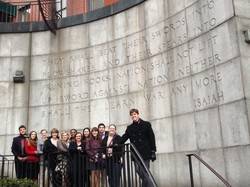 Today, students from Elon University joined us at the Presbyterian Ministry at the United Nations to look at the post-2015 development agenda, the United Nations Millennium Development Goals and intersections between social action and poverty.
Today, students from Elon University joined us at the Presbyterian Ministry at the United Nations to look at the post-2015 development agenda, the United Nations Millennium Development Goals and intersections between social action and poverty.
As part of their seminar, the group had the chance to visit the Permanent Mission of the United States to the United Nations. The event, “Rising Tide of Restrictions on Religion: Religions Respond” was co-sponsored by the NGO Committee on Religious Freedom.
Below is a press statement by Ambassador Power on the International Day of Religious Freedom.
Statement by Ambassador Samantha Power, U.S. Permanent Representative to the United Nations, on Religious Freedom Day, January 16, 2014
Religious freedom is a founding principle of the United States, its promise so essential to the American spirit that it was enshrined in the very first amendment to our constitution. But the belief that all people should be free to hold and profess their own religious views, values, and opinions is not just an American value, it’s a right guaranteed to all humans by the Universal Declaration of Human Rights. For centuries – from the original pilgrims to eastern European Jews to refugees from all corners of the world today – people have fled religious persecution in their own lands to travel to America, where they could practice freely. On Religious Freedom Day, let us recommit to that ideal and pledge to protect those around the world who are marginalized or persecuted for their faith.
In a new report by the Pew Research Center presented at the U.S. Mission to the United Nations today, religiously motivated hostility has reached a 6-year high. Over 5 billion people – or 76% of the world’s population – live in places with high or very high levels of restrictions on religion, up from 68% in 2007. In Burma, Muslim Rohingyas are denied the rights of citizenship, instead forced into dangerous labor conditions, told what they can and can’t study, and subjected to a two-child limit. In Syria, some Christian civilians, including nuns and priests, are kidnapped, threatened, and forced to convert. In North Korea, where owning a bible is against the law, people are imprisoned, tortured, and killed for their religious activities and affiliations.
These are just a few of the far too many examples of religious persecution that persist in our world, and the United States is proud to be leading the fight against all forms of religious intolerance, wherever they exist. Protecting freedom of religion is a cornerstone of American foreign policy, carried out by prioritizing accountability for religiously-motivated violence, urging governments to adopt legal protections for religious minorities, and promoting societal respect for religious diversity. And at the United Nations, we work with our partners to fight for the world’s religious minorities, including adoption of the landmark Human Rights Council resolution calling on member states to combat intolerance, violence, and discrimination based on religion.
Make no mistake, freedom of religion is fundamental to human dignity – an inalienable liberty essential to who we are as human beings. Today, on Religious Freedom Day, Americans should honor the proud legacy of tolerance passed down by our founders, and continue to work for freedom of faith as a core human right all around the world.
###